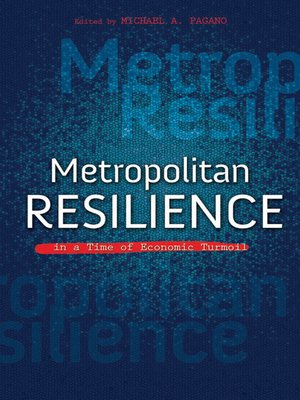
Sign up to save your library
With an OverDrive account, you can save your favorite libraries for at-a-glance information about availability. Find out more about OverDrive accounts.
Find this title in Libby, the library reading app by OverDrive.



Search for a digital library with this title
Title found at these libraries:
| Library Name | Distance |
|---|---|
| Loading... |
Cities, counties, school districts and other local governments have suffered a long-lasting period of fiscal challenges since the beginning of the Great Recession. Metropolitan governments continue to adjust to the "new normal" of sharply lower property values, consumer sales, and personal income. Contributors to this volume include elected officials, academics, key people in city administrations, and other nationally recognized experts who discuss solutions to the urban problems created by the Great Recession.
Metropolitan Resilience in a Time of Economic Turmoil looks at the capacity of local governments to mobilize resources efficiently and effectively, as well as the overall effects of the long-term economic downturn on quality of life. Introducing the reader to the fiscal effects of the Great Recession on cities, the book examines the initial fraying and subsequent mending of the social safety net, the opportunities for pursuing economic development strategies, the challenges of inter-jurisdictional cooperation, and the legacy costs of pension liabilities and infrastructure decay.
Contributors are Phil Ashton, Raphael Bostic, Richard Feiock, Rachel A. Gordon, Rebecca Hendrick, Geoffrey J.D. Hewings, David Merriman, Richard Nathan, Michael A. Pagano, Breeze Richardson, Annette Steinacker, Nik Theodore, Rachel Weber, and Margaret Weir.
| Cover Title Page Copyright Contents Preface and Acknowledgments Part One: Overview Cities and the Great Recession Part Two: White Papers Building the Local Social Safety Net in an Era of Fiscal Constraint Resilient Economic Development How Cities Collaborate While Competing in the New Economy The Legacy Costs of Earlier Decisions Part Three: Summary Converstaions with Local Policy Officials Part Four: Policy Experiments What Now? Contributors |"Particularly important at a time when cities and metros are compelled to innovate and problem-solve on their own, given the absence of federal and often state leadership."—Bruce Katz, coauthor of The Metropolitan Revolution"This book reveals the potential of metropolitan regions to cure, but also to transcend, endemic impasses beyond their respective borders. This well-written and insightful book is a must-read for scholars as well as policy makers."—Political Studies Review
"In this book, Michael A. Pagano brings together a stellar set of multidisciplinary and multigenerational scholars to reconsider the urban agenda in the post–Great Recession era. They offer a coherent focus on local capacities for adaptation and change in dealing with core issues such as infrastructure, pensions, economic vitality, social safety nets, and collaborative initiatives."—Susan E. Clarke, coeditor of The Oxford Handbook on Urban Politics
|Michael Pagano is dean of the College of Urban Planning and Public Affairs and professor of public administration at the University of Illinois at Chicago (UIC). He is a fellow of the National Academy of Public Administration, faculty fellow of UIC's Great Cities Institute, and coeditor of The Dynamics of Federalism in National and Supranational Political Systems.







